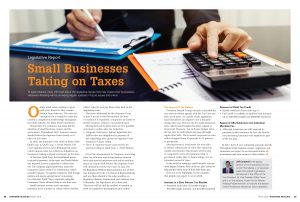
Click the picture to download a PDF of this story.
To keep retailers more informed about the legislative issues that may impact their businesses, Hardware Retailing will be providing regular updates in future issues and online.
Online retail sales continue to grow each year, however, they remain exempt from sales tax. The sales tax exemption for e-commerce sales has created a competitive disadvantage throughout the retail industry for Main Street businesses.
The growth of e-commerce has attracted the attention of small business owners and the government. Throughout 2018, business owners should follow the Supreme Court closely as it takes on this issue.
In 1992, the Supreme Court ruled in favor of the Quill Corp. in Quill Corp. v. North Dakota. The court upheld previous laws affirming that states cannot impose sales tax collection obligations on businesses lacking a physical presence in the state.
At the time, Quill Corp. had established nexus, or physical presence, in the state, and North Dakota law required in-state companies to collect sales tax. The company argued protection under the Commerce Clause of the U.S. Constitution, which permits Congress “to regulate commerce with foreign nations and among several states” concerning tax collection. Quill Corp.’s argument using the Commerce Clause allowed them to win their case.
Small business owners and consumers primarily favor a system in which online retailers collect sales tax and pay those taxes back to the originating state.
The issue addressed by the Supreme Court is that if nexus is the determinant for how e-commerce is regulated, companies are liable to double taxation, which is unconstitutional.
Moving forward in 2018, there are two possible outcomes to online sales tax collection.
- Congress could pass a federal regulation that fulfills sales tax obligations by payment of the originating state, given the Supreme Court Commerce Clause ruling.
- The U.S. Supreme Court could reverse its previous ruling in Quill Corp. v. North Dakota.
Given the disagreement in Congress concerning sales tax solutions and rising tension between brick-and-mortar businesses and online retailers, many on Capitol Hill believe the Supreme Court will ultimately resolve the issue. In July, the No Regulation Without Representation Act of 2017 was introduced in the U.S. House of Representatives and was then referred to the subcommittee on Regulatory Reform, Commercial and Antitrust Law. Ultimately, the legislation hit a dead end. This issue will be vital for retailers to monitor in 2018 as competitive marketplaces grow online.
The Impact of Tax Reform
President Donald Trump recently concluded his one-year tax reform agenda with the Tax Cuts and Jobs Act of 2017. As a result of this legislation, small businesses can expect to see a dramatic change this year. The tax rate for small businesses (also called pass-throughs) has been capped at 25 percent. However, due to Senate budget rules, the tax cuts for individuals and pass-throughs expire after 2025. The lowered corporate tax rate, which dropped from 35 percent to 21 percent, is permanent.
Moving forward, businesses are now able to deduct 100 percent of what they spend on capital investments. Businesses will be able to completely write off equipment that is purchased rather than it depreciating over an extended period of time.
In the world of running a retail business, success often begins at home. Parts of the tax plan intend to help people retain more of their take-home pay.
Here are a few highlights, by the numbers, that people can expect to see in 2018.
Increase in a Zero Percent Tax Bracket
- Standard deduction of $12,000 (single), $18,000 (single parents), and $24,000 (married)
Renewal of Child Tax Credit
- $2,000 credit per child under age 17
- Full credit is available to families with incomes up to $200,000 (single) and $400,000 (married)
Repeal of Affordable Care Act Individual Mandate Fee
- Although Americans are still required to purchase health insurance by law, the fine for not purchasing insurance was repealed as part of the tax plan.
In 2017, the U.S. saw substantial economic growth. Throughout 2018, business owners, employees and consumers can expect to see increased returns on investments and more money in their wallets.
 Jeff Cardwell is the deputy director of communications for the Lincoln Roundtable, a conservative grassroots political organization. He interned in the Office of the Vice President for Vice President Mike Pence and is on the advisory council for the People Helping People Network, a nonprofit that assists Central Americans affected by natural disasters.
Jeff Cardwell is the deputy director of communications for the Lincoln Roundtable, a conservative grassroots political organization. He interned in the Office of the Vice President for Vice President Mike Pence and is on the advisory council for the People Helping People Network, a nonprofit that assists Central Americans affected by natural disasters.
 Hardware Retailing The Industry's Source for Insights and Information
Hardware Retailing The Industry's Source for Insights and Information







